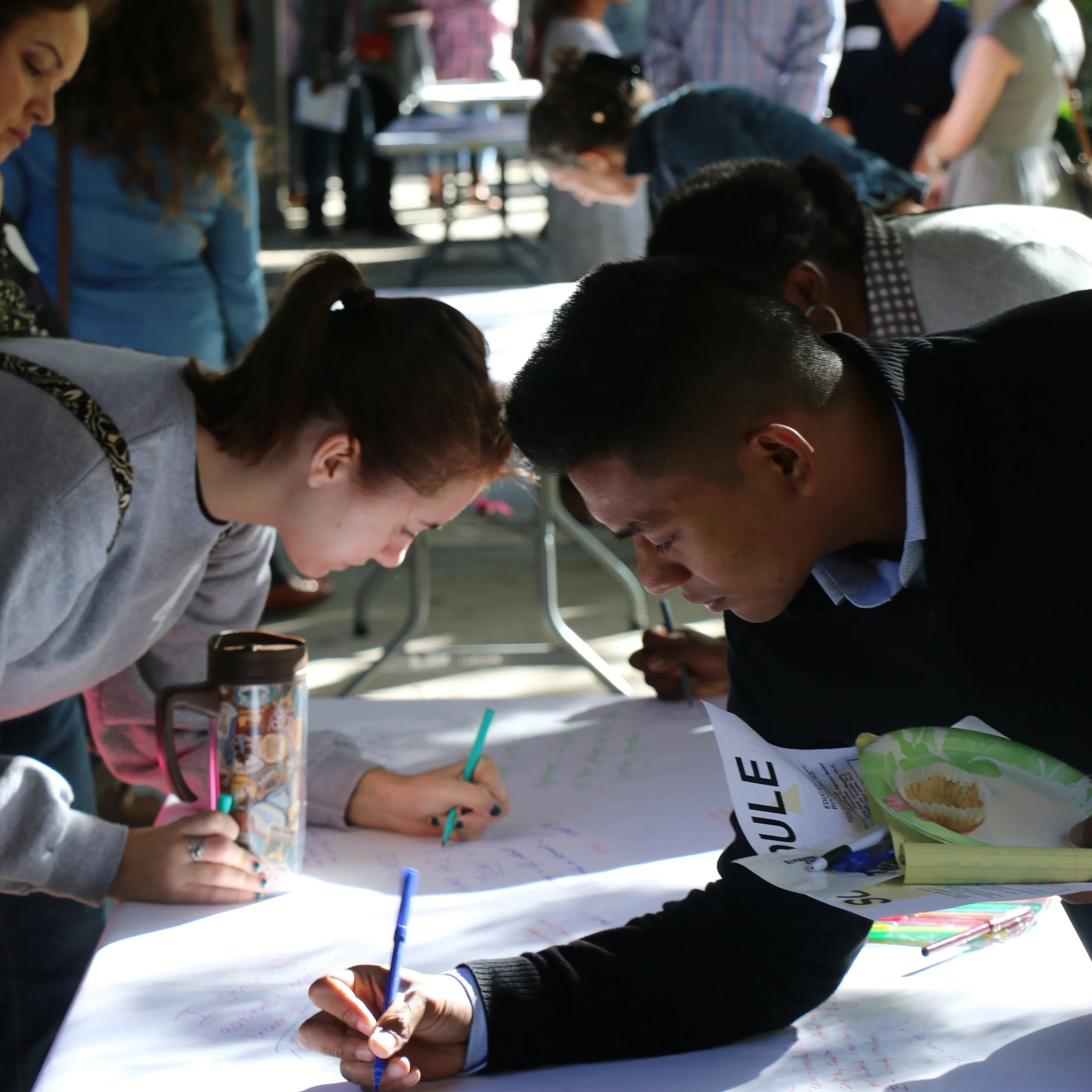STORY:GNV
On November 5, 2016, Self Narrate hosted STORY:GNV, Gainesville’s first story development conference. Nearly 100 change-makers and storytellers arrived at the United Church of Gainesville, eager to connect and learn from each other. In addition to the talks, panels, and network, we attempted to crowd-source answers to complex questions from the STORY:GNV attendees. We did this through Chalk Talks.
What is a Chalk Talk?
Chalk Talks are a silent way to do reflection, generate ideas, develop projects or solve problems. We had four tables covered with paper and a question written on each one. Attendees were encouraged to take one of the provided markers and answer the questions as they felt moved. In a Chalk Talk, one is encouraged to question, comment on, or react to other people’s ideas by drawing a connecting line to the comment. Chalk Talks are a silent activity so while one was at the Chalk Talk tables, they were asked to communicate through writing rather than speaking.
If you're interested in learning more about Chalk Talks and how to implement them yourself, check out this white paper on the activity from the National School Reform Faculty: LINK
We've analyzed the STORY:GNV Chalk Talks to show what Gainesville's storytellers think about the intersection of story and community development.
What you'll find below is an analysis of the responses to each individual Chalk Talk question, as well as a description of findings gleaned from looking at them as a whole. To help visualize the responses, we created word clouds to show the most commonly occurring words and phrases.
If you'd like to look at all of the Chalk Talk responses...
Here is a PDF of the transcriptions: DOWNLOAD
Here is a ZIP file of images of the Chalk Talk papers (Please note they had to be stitched together in Photoshop because the pages were too big to scan): PART 1 - PART 2
Overall Takeaways
Storytelling is the most effective way to create connections and build bridges of community.
Word cloud visualization of every key word in all four Chalk Talk Questions
When you look at all of the words in all of the chalk talks, filtering out non-relevant words (like ‘the’), you find patterns quickly. Many of the most common words used in every question can be filtered into categories like:
- Connection
- Community
- Growth
- Communication
- Story (This makes sense, given that the word story is in the name of the conference)
- Feeling
The most common key words from all 4 questions
This second word cloud format is a more straight-forward format to see the most commonly-used words in the chalk talks. It clearly shows that three of the most common words are: story, community, and connect.
Our community values these words. Our community sees that storytelling produces these values.
Question 1: Are you living your authentic story? If so, how? If not, how could you be?
Digging deeper, the first Chalk Talk question asks for a personal perspective. A community is made up of individuals, so before widening out, we have to start by reflecting on our own lives.
The answers provided are intriguing.
The wording of the question lends authentic and story to be top word choices. Filtering them out, you find wide ranging answers from different places in life. Individuals who responded to the question with "no" went on to use negative words like trapped. People in the process of discovering what their story express it as a path or journey with great optimism. This is also where the most connections occur between comments on this Chalk Talk. People relate to each other’s honesty on the journey.
There also seems to be a sense of relief when you feel you are living your story.
A recurring theme is intentionality.
You must be intentional to walk the path of self-discovery.
The word clouds back these findings up. Journey and intentionality are among the biggest (most recurring) words.
Takeaway:
Tension comes when we know we are not living the life we know we should be living: when we are telling the wrong story. Living our authentic story takes intention and can be a long journey, but it will be meaningful and a relief to do so.
Question 2: How has storytelling impacted your work?
Once again, story/storytelling/work, all words in the actual question, are popular for obvious reasons, but even just a cursory look at the word clouds shows communicate and understand are big connections here.
When practiced in the workplace, storytelling enhances our ability to clearly express our work and be understood by others. Also of note is that, reading all responses, you find a theme in improvement. Your work is better, your relationships stronger, and your connections built deeper. As one chalk talker said, storytelling “makes us emotionally accessible.” No matter what your work entails, if you are accessible, you are going to be able to do your work better than if you are not.
On the personal side, there is a through line of story helping to define vision, motivations, goals, and passion. One of the comments sums it up: “when you know your story, you know your self.”
Takeaway:
Being able to articulate your story helps your work be understood and create connections. Knowing your story in your work helps you stay motivated and on a purposeful, meaningful path.
Question 3: What would you like the story of Gainesville to be?
This is a very open-ended question. The issues that one sees in a community depends on their vantage point: their experiences, what/who they are connected with, and what they think defines a community. So there are a wide variety of ideas here and it is worth your time to read through all of them (see transcription PDF download link above).
Attendees looked to Gainesville to be a place of purpose and compassion, a unique space built on a rich creative culture and environment. The conversation gravitated towards strains of “what is Gainesville’s story?” One thread asked the question “is there a story for Gainesville?” A second thread emerged related to how we define the story of Gainesville for all communities in the city: “our stories are Gainesville’s stories.” By telling our stories we build commonality and understanding. This is how we create community. Community was also the most used word in the word cloud. Gainesville citizens care about the community. By giving voice to all stories, even the ones we tend to avoid, Gainesville creates its unique culture of compassion and purpose.
I also want to highlight the conversation around Gainesville being a “vulnerable community.” This is a term mentioned in these chalk talks that I had never heard before. It is defined in this Chalk Talk as a community that connects by bringing together diverse communities, especially those defined as “at risk," which creates opportunities for greater connection. Being vulnerable is not easy, but it is an investment for greater growth. (For more on vulnerability, see: Brené Brown’s research on vulnerability.) Honestly, I’m not sure that fully gets at what a "vulnerable community" is, but it’s a concept worth thinking about and exploring. Can Gainesville be the country’s first Vulnerable City? What would that look like?
Takeaway:
Gainesville has a unique story of compassion that is defined when we share our stories with each other.
Question 4: How can we use storytelling to better Gainesville?
Beyond asking what we could be, we wanted to explore how we get there.
Overall, the answers seen here circle around the idea of using storytelling to create connections and build bridges. A better Gainesville is one where everyone has a seat at the table and where every story carries equal weight. This is a Gainesville where our culture, environment and health are nurtured. Yes, Gainesville is growing and changing in the physical sense, but it is managing it well as the personal growth is focused on as well.
Takeaway:
As Gainesville is growing, to be a better Gainesveille, we must create spaces for the stories of all to be heard.
Final Thoughts
Chalk talks are designed to crowd source answers to complex questions. Questions of personal and community-level meaning are rich with nuance and depth. We encourage you to read the responses for yourself, but we hope that the above analysis helps to dig through the responses from STORY:GNV. There are many more connections to be made, and we encourage you to leave comments below with your findings and answers to the questions asked.
See you at STORY:GNV 2017.





